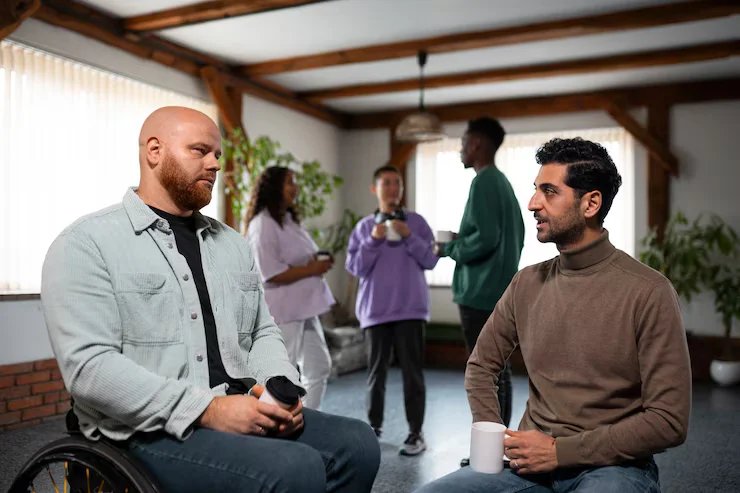Taking the first step toward rehab can feel like standing on a cliff, staring down into the unknown. Not because people don’t want to get better—most do. The fear often comes from everything rehab might shake loose. Who will find out? Will it destroy a career, wreck a relationship, send up a flare to neighbors or coworkers who start whispering behind closed doors? In a culture that still treats addiction like a moral failure instead of the medical condition it is, the emotional weight of exposure can feel heavier than the recovery process itself.
But that doesn’t mean the fear gets to win. There are ways to enter treatment without lighting your entire life on fire. People do it quietly, privately, and successfully every day. The key is knowing how rehab really works—and how much more flexible, protective, and accommodating it is than many imagine.
Addiction Doesn’t Always Look Like the Stereotype
There’s a misconception that the only people who go to rehab are those who’ve hit rock bottom in some dramatic, movie-script way. But many people who check into treatment are holding down jobs, raising kids, managing schedules, and masking their struggles. They’re professionals. Parents. High-achievers. People who are really good at pretending everything’s fine—until it no longer is.
Addiction doesn’t always announce itself. Sometimes it’s the nightly wine that slowly becomes a bottle. The prescriptions that seemed harmless until they didn’t. The “just on weekends” drug use that started to bleed into Tuesday afternoons. The trouble is, by the time someone is thinking seriously about rehab, they’re often past the point where moderation or self-help books will fix anything. The worry, though, isn’t just about getting clean. It’s about who will notice—and what that fallout might look like.
But the idea that going to rehab will immediately expose you is outdated. A lot of modern programs are built around protecting people’s privacy and giving them options that don’t blow up their routines. Discretion isn’t an afterthought anymore. It’s baked in.
Can You Go Without Losing Your Job or Your Reputation?
Work is one of the biggest hurdles. Plenty of people delay rehab because they assume it means losing income, disappointing bosses, or dealing with office gossip they’d rather avoid. But here’s the thing: can you get fired for going to rehab? Not if you do it the right way.
Under federal law, employees are often protected if they seek treatment. The key is being proactive—taking the step before the addiction starts impacting job performance or causing workplace issues. If you wait until there’s already a problem, protections shrink. But if you step forward early and communicate professionally (often with HR or through short-term disability), your position is usually more secure than you think.
Beyond legal protections, more employers are starting to see addiction through a health lens. Especially in industries where burnout is high, there’s growing recognition that addressing the issue can lead to better performance and retention, not worse. Some companies even offer confidential Employee Assistance Programs that help with finding treatment.
For those who can’t—or don’t want to—step away from work completely, outpatient options are on the table too. These programs offer therapy, medical care, and recovery support in the evenings or on a flexible schedule. You still live at home. You still show up to work. But you’re also doing the hard work of getting better, without clocking out on your whole life.
Family Pressure and the Fear of Judgment
While some people worry about what coworkers will think, others are more concerned about family. That includes parents, kids, in-laws, or even spouses who may not know how deep the struggle has gotten. For many, the fear of disappointing loved ones runs deeper than the fear of withdrawal.
That fear is understandable, but it’s also often exaggerated. Families tend to notice more than they let on, even when people think they’re hiding it well. In many cases, starting treatment ends up bringing relief—not disappointment. It shows that change is finally in motion. The honesty, while uncomfortable at first, opens doors to repair what addiction may have slowly eroded.
Rehab programs often include family therapy or support for loved ones too. The goal isn’t just detoxing or managing triggers—it’s rebuilding trust and creating a support system strong enough to carry through the months after treatment ends. That kind of relational healing doesn’t happen in secret, but it also doesn’t have to involve drama or shame. The right conversations, at the right time, can reset a whole household.
Unlock even more knowledge—tap into our handpicked articles just for you.
How to Keep Your Treatment Private
For those who still want privacy—either because of professional concerns, public-facing roles, or just personal boundaries—it’s worth knowing how many options exist to protect it. Many treatment centers offer full confidentiality, even allowing clients to use aliases or avoid group settings entirely.
There are also virtual programs now, especially in larger states, that provide structured therapy and support from home. These are especially common for people who want a virtual IOP in California, Texas or New York, where commuting or overnight stays aren’t practical. These options tend to work well for people with kids, demanding jobs, or specific privacy needs.
And if the idea of being spotted at a facility sends your anxiety through the roof, there are even luxury or boutique programs that cater to discretion. Think smaller client numbers, private entrances, unlisted locations. They’re not about frills—they’re about letting people heal without feeling like they’ve been put on display.
In other words, if you’re asking how to protect your privacy, you’re not alone. And you’re not out of luck. There are real-world strategies and services designed for people in exactly that position. Finding the right rehab often means finding one that respects your privacy as much as it does your health.
When Fear Delays Help That’s Already Needed
Waiting until “things get worse” before making the call is one of the most common traps. People delay rehab because they want to get through a holiday, finish a big project, avoid a confrontation, or just try to prove to themselves they can manage on their own a little longer.
But addiction tends to move in only one direction if left alone. By the time someone finally reaches out, there’s often a wave of regret that they didn’t do it sooner. And the irony? The things people were most afraid of—getting judged, losing opportunities, facing awkward conversations—usually don’t play out the way they feared. It’s the silence, the stalling, and the pretending that end up costing more.
Treatment isn’t always convenient. It may not come with perfect timing. But the sooner it’s started, the more there is left to save. That includes reputations, careers, relationships—and the person beneath all of it, who’s likely been hanging on by a thread.
Closing Thought
Addiction recovery doesn’t have to begin with a public declaration or a dramatic breakdown. It can start quietly, intentionally, and without losing everything that matters. Getting help shouldn’t come at the price of your privacy. And in today’s world, it doesn’t have to.
Discover fresh content every day—visit 2A Magazine.







